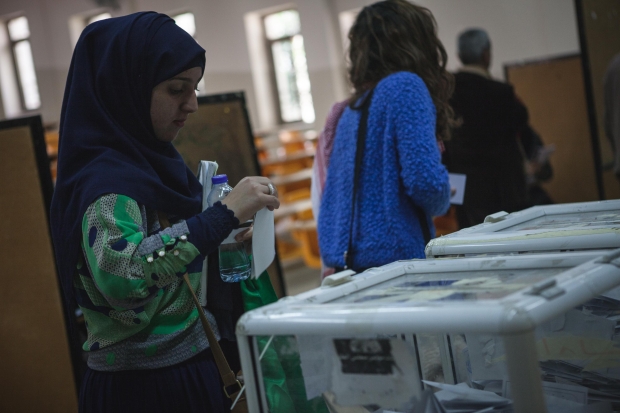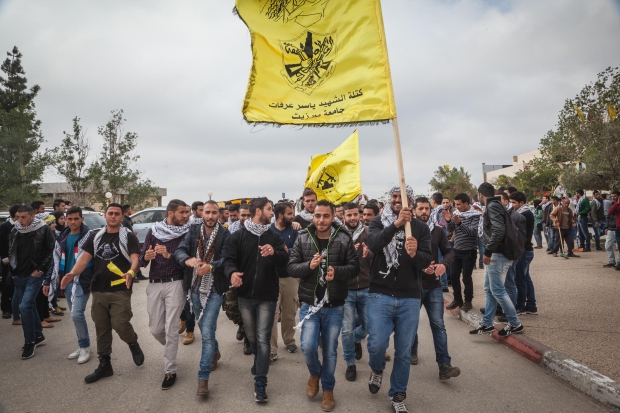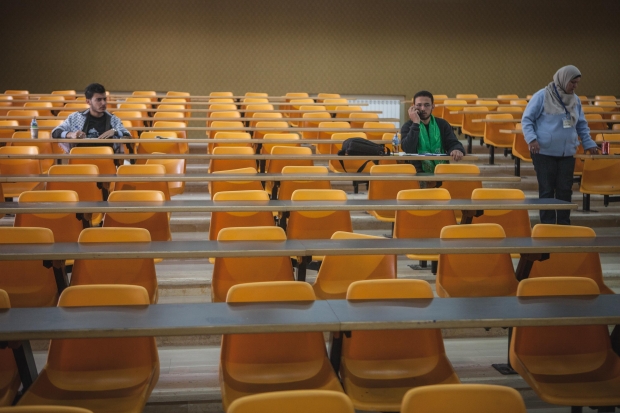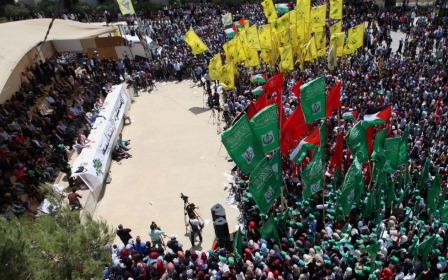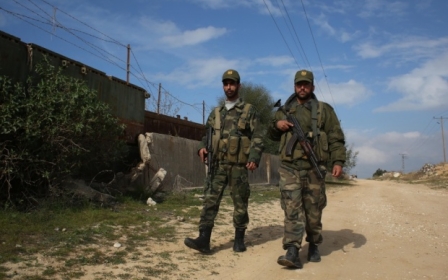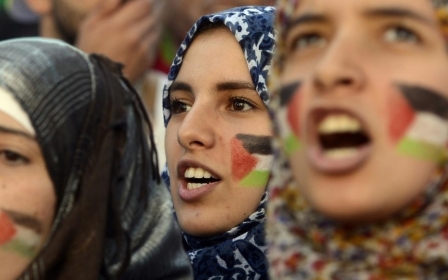Palestine can't vote, but its students can, and will

RAMALLAH, West Bank - Omar, 21, hasn’t slept in his own bed for seven months. He’s afraid he’ll be arrested by Israeli or Palestinian security forces if he goes home. “If you join Hamas at university, you should take it for granted you’ll be monitored and arrested,” he told Middle East Eye in offices at Birzeit University near Ramallah.
Omar plays a prominent organisational role in the Wafaa Islamic Bloc, the student organisation allied with Hamas that swept to a surprise victory in Birzeit University's highly anticipated student council elections on 22 April.
Off campus, Omar has been arrested twice by Palestinian Authority security forces for his affiliation with Hamas. He says he is targeted by the Israeli army too. Within the walls of Birzeit University, however, students are granted freedom of political expression in student council elections which are a central component in the university’s regulations and traditions.
As ballot boxes from voting stations across campus were tallied by the university’s volunteer election committee comprised of staff, administration, and students, it quickly emerged that the Wafaa Islamic Bloc would comfortably oust last year’s winners al-Shabiba, who are allied with Fatah.
Political factions represented by students
Head of the elections committee Mohammad al-Ahmad told reporters at the university that 77 percent of 9,135 eligible students had cast votes in the elections.
Dr Ghassan Khatib, vice president of Birzeit University, told Middle East Eye that the university strives to provide an atmosphere on campus where “freedom of expression and debate, and competition of ideas can flourish in a civilised way.”
Palestine’s prominent political factions, including Hamas, which won 26 of 51 available seats on the council, Fatah, which won 19, and leftists Popular Front for the Liberation of Palestine, who came away with five seats, were all represented by student candidates in the university’s elections.
The Birzeit Student Alliance, which put gender equality at the fore of their manifesto, won just one seat in their premiere appearance in the university elections.
Birzeit University administration told Middle East Eye that Hamas’ pre-election campaign more impressively addressed students’ issues compared with competing campaigns. Hamas’ performance in pre-election debates, which were closed to international media at the student body’s request, purportedly gripped the attention of students.
“The students were really listening to Hamas,” one university administrator told Middle East Eye.
Student elections in absence of general elections
“The results are not shocking to anyone, said Dr Khatib. In 34 years of elections at Birzeit, results each year are “consistent with everyone’s expectations,” he said. “It’s a competition between Fatah and Hamas. This is what we have in society, more or less.”
Adnan, a fourth-year mechanical engineering student who voted for the Alliance, said the Palestinian Authority looks to Birzeit student council election results to forecast the outcome of the next general elections, which have been postponed indefinitely.
“We have people from all the major cities studying at Birzeit University,” Adnan said, “If you analyse the politics of the student population here, you can analyse the politics of the entire West Bank.”
This, says, Dr Khatib, was especially true before the establishment of the Palestinian Authority after the Oslo accords in 1994. “There used to be almost no elections in Palestine, except at Birzeit. Political factions used the results of elections at Birzeit as an indicator between the balance of power between factions.”
Because Palestinians last voted in general elections in 2006, Dr Ghassan says that, increasingly, “analysts and politicians see student council election results as an indicator for society’s political outlook.”
The Islamic Bloc’s resounding victory at Birzeit spawned celebrations in Gaza Wednesday evening. Hamas spokesperson Sami Abu Zuhri said the elections results proved that, “Hamas is getting stronger and larger despite coordinated efforts to weaken the group.”
The political stagnation that has put a halt to general elections in Palestine since 2006 has not hampered elections at Birzeit.
“We’ve been hosting elections for 34 years against all odds,” said Dr Khatib. “We’re proud to have ensured elections even during the toughest years of occupation and in the toughest years of splits between Palestinian factions.
“The elections at the university matter because they’re happening in a country where elections are becoming increasingly rare,” said Dr. Khatib. “What’s more, elections are happening in a completely conducive atmosphere in the university.”
“We believe that preparing students to be better citizens is part of our educational mission at the university. That education includes an understanding for the need for elections and the civilised way of competition between different views,” he added.
Political expression hampered by arrests
While Birzeit University strives to be a bastion of freedom of political expression for its student body, “we’re not successful 100 percent of the time,” Dr Khatib acknowledges. “Sometimes students get arrested for their positions, their views, or their attitudes.”
At least 76 students and one Birzeit professor are currently in Israeli detention, according to Right to Education, a Birzeit University organisation that monitors student arrests. The group’s statistics, which do not include numbers of students arrested by the Palestinian Authority, show that more than 500 students have been arrested in the last five years, almost all for alleged political activity.
The al-Shabiba student bloc allied with Fatah were the only party on Birzeit’s ballot not to have student members in Palestinian Authority detention. Faris Zawahreh, a student representative, denies members of the Fatah allied student group inform on opposition students’ political activities on campus to PA security forces.
“We denounce all politically motivated arrests, whether it is the Israeli army arresting Fatah or Hamas students at Birzeit, or the Hamas government in Gaza arresting members of Fatah,” Zawahreh told Middle East Eye.
PA threats and coercion
But students in the Islamic Bloc, the student group allied with the PFLP, and the Alliance told Middle East Eye that student members had received threatening phone calls from members of the Palestinian Authority and their student representation on campus, coercing them into voting for al-Shabiba.
A Birzeit student said that while the Wafaa bloc came off as the much stronger candidates during the election campaign, she expects the students active within the Islamic bloc to be arrested by the PA.
“The last time Hamas won in the [Birzeit] student elections, the entire student leaders of the Wafaa bloc were arrested by the PA’s preventative security forces,” the student said, who did not want to be identified.
“I expect the same thing to happen this year,” she added.
Asked if the group maintains links with PFLP leadership, student representative Nagham told Middle East Eye: “This kind of information is not easy to give. Because of the Israeli occupation, if we declare - or don’t declare - that we have communications with PFLP leadership then it will be dangerous for many comrades in the body.”
When Birzeit students or faculty are arrested by Palestinian or Israeli security forces, the university hires legal counsel to represent those detained. It publicises the arrests in local, international, and on social media. In cases where the Palestinian Authority arrests students, Dr Khatib says the university administration petitions the government, including the Prime Minister Abbas and President Hamdallah.
Omar, who says 15 core members of the Waafa Islamic Bloc chose not to sleep in their houses because they fear arrest by Israel, says the elections are important because “this is the closest and most accurate result Palestine has to general elections.”
“It’s significant for us, as Hamas, to have these elections in Ramallah, so near the seat of Palestinian governance,” he added.
Liberal and authoritarian attitudes
Dr Samir Awad, professor of international relations in Birzeit University’s political science department, says not all schools in Palestine are as politically open for students as Birzeit.
“Unfortunately, I think that this liberal attitude toward student politics is typical of a select number of schools: Birzeit and Bethlehem in particular. For example an-Najah University in Nablus is very different. There are many security personnel who exert political pressure on an-Najah students on campus.”
He describes an-Najah University, which controversially postponed its student council elections this year, as “a very authoritarian institution of education.”
“The students here operate a more transparent democratic system at Birzeit than Palestine’s political leadership. My hope is that when they graduate, when they go out to the street, they don’t lose that quality they have learned in Birzeit. My hope is that as citizens of Palestine, they will demand rights and political transparency in society.”
New MEE newsletter: Jerusalem Dispatch
Sign up to get the latest insights and analysis on Israel-Palestine, alongside Turkey Unpacked and other MEE newsletters
Middle East Eye delivers independent and unrivalled coverage and analysis of the Middle East, North Africa and beyond. To learn more about republishing this content and the associated fees, please fill out this form. More about MEE can be found here.


